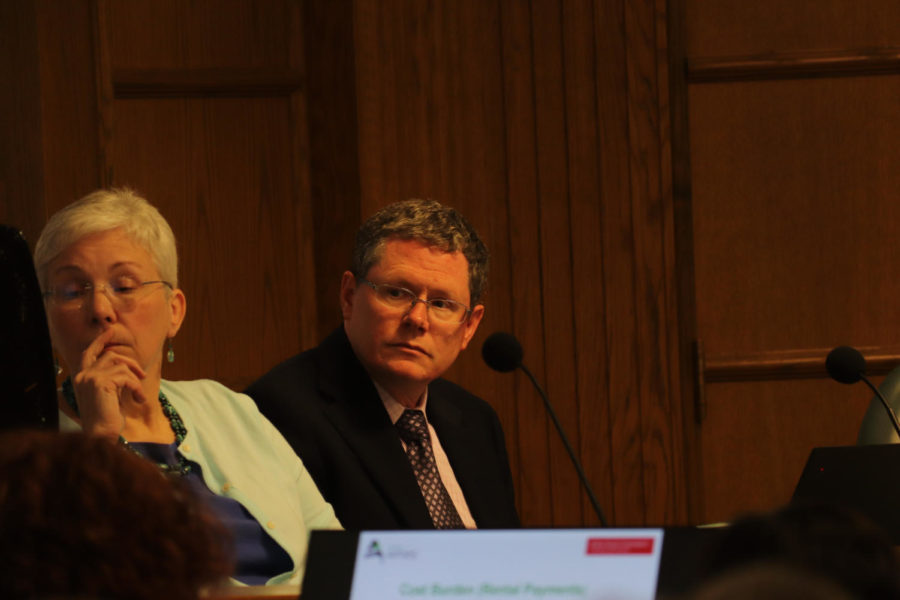City Council approves contract for solar farm
Grant Tetmeyer/Iowa State Daily
Third Ward Representative David Martin at an Ames City Council meeting on June 18. The council discussed solar energy and approved ASSET spending for next year in their meeting.
July 24, 2019
The council was met with applause upon approving a contract with ForeFront Power to begin the operations of a two-megawatt community solar farm at its Tuesday meeting.
The community solar array follows the example of Cedar Falls Utility — home to Iowa’s largest community solar project — calling on a private developer to capitalize on federal tax incentives, purchasing the generated energy and selling to Ames electric customers in the form of power packs.
The cost of each power pack, or share, comes to $333 and is expected to generate 2.5% of an average home’s annual electric usage. Shareholders will receive a monthly credit on their utility bill for the electricity generated by their share in the project. The site of the solar farm will be adjacent to the Ames Municipal Airport.
Solar power is indeed on the rise in Ames, as the number of individual solar installations has grown from 20 to 130 since 2016. For new installations of solar energy systems, the city provides a one-time rebate for the customer of $300 per kW. However, economically, the benefits of solar power do not fall equally upon everyone.
“I think this is a little more complicated than what is on the agenda tonight,” Ward 2 Rep. Tim Gartin said. “It seems that … the rest of the community will be subsidizing in essence the amount that is paid to the [shareholder].”
When solar panels produce more than their energy demands require, the excess energy is purchased by municipal utilities, working like a credit to the household.
Referred to as net metering, these policies allow consumers who produce some or all of their own energy to use that energy outside of the time it is being generated. In other words, energy from a windy day can be used on a calm day; energy created while the sun is up can be used after the sun has set.
The council was presented with issues facing current net metering practices. The excess energy being produced by solar installations is retained by the city grid, creating a situation where the solar customer does not pay for the costs of operating and maintaining that energy through the grid. Instead, the cost is shifted to those who do not own access to solar power in the form of a slightly higher utility bill.
In response, the city separated the energy costs from the delivery system costs. While city staff recommended no further changes be made to current net metering policies, the council requested that additional incentives be explored to facilitate increased accessibility and lower cost burdens of solar power transitions.
“As a body of elected officials, I would like to see council actually move towards greater incentivization,” Martin said. “I think this is an area where we can encourage the construction of solar systems that aren’t being built right now.”
City Council voted, rescinded its vote, and ultimately delayed its hearing on the enduring Guest Lodging Ordinance. Under municipal language, guest lodging is defined as 31 or less consecutive days rented to the same person.
“We are effectively right now putting people out of business that have been coming here for over a year, trying to work with us to continue operating responsibly in this community,” At-Large Rep. Amber Corrieri said. “We just completely shut them down, without a council member here by the way.”
The ordinance will be revisited at a later meeting, with all council members present.
The council approved ASSET (Analysis of Social Service Evaluation Team) funding priorities for fiscal year 2020/21.
Gartin asked Assistant City Manager Deb Schildroth to outline the mental health services currently available to youth in the community.
“I’m very supportive of what we have on the table,” Gartin said. “While our community is experiencing a recent tragedy, the passing of a high school student who took her life about a week ago … could you take a second to share the specifics of mental healthcare for youth?”
In response, Schildroth outlined crisis and counseling services offered through YSS (Youth Standing Strong), free to uninsured youth. Additionally, Schildroth introduced a comprehensive community needs assessment that will focus and detail future funding priorities.







